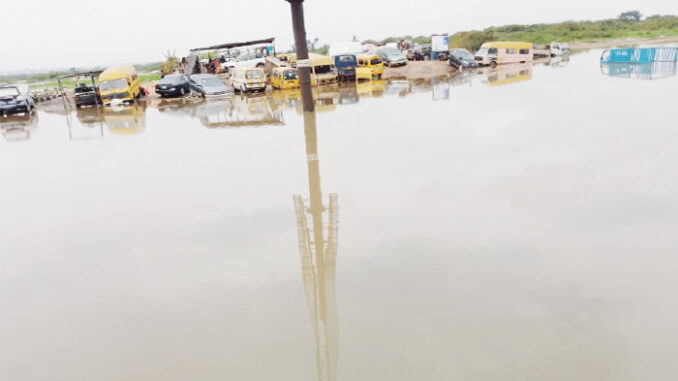
FOR Lagos and Ogun state residents, the imminent seasonal rains might not bring any respite as the projected deluge threatens to displace them from their homes while wreaking havoc on the roads and other infrastructure.
As the rains beckon, the Lagos State Commissioner for the Environment and Water Resources, Tokunbo Wahab, stated that based on the Nigerian Metrological Agency’s 2024 Seasonal Climate Predictions, the state and the neighbouring Ogun State would experience normal to above normal rainfall. Wahab said the season would open in April and end in early December.
With the predicted average annual rainfall amount pegged at 1936.2 millimetres, which could lead to flash floods, Wahab advised residents living in wetlands and low-lying areas in both states to move upland to avert the loss of lives and properties.
But the states and the Federal Government must go beyond paying lip service to mounting credible defensive measures to prevent disastrous flooding episodes in April and the forthcoming months.
It behoves the state governments to provide residents with safe and conducive spaces for relocation. Essential services, including relief materials, shelter, healthcare, and security must be provided to ameliorate the trauma of relocated families.
Crucially, this is not a one-sided matter. Residents must also be prepared to relocate from their homes and comfort zones to prevent avoidable deaths and loss of valuable properties.
The rapine of flood disasters is unpalatable. In 2023, the National Emergency Management Agency stated that 45 persons died, while 171,545 persons were displaced in 13 states due to widespread flooding. Unfortunately, 22,666 homes were partially damaged; 5,358 other homes were destroyed. NIMET stated that $4.6 billion led to a significant loss in the country’s GDP. Lagos was among the states that were adversely affected.
In 2022, flooding claimed 662 citizens, 2.43 million others were displaced and 3,174 injured nationwide, per NEMA. The losses were estimated at $9.12 billion by the Federal Government, and by a United Nations agency at $7 billion. A UN report stated that food insecurity was aggravated in the country as 569,000 hectares of farmland were destroyed by the flood.
According to the then minister of water resources, Suleiman Adamu, 178 Local Government Areas in 32 states of the federation were declared “highly probable flood risk states.” These states include Adamawa, Abia, Akwa Ibom, Anambra, Bauchi, Bayelsa, Benue, Cross River, Delta, Ebonyi, Ekiti, Edo, and Gombe. Others are Imo, Jigawa, Kaduna, Kano, Kebbi, Kogi, Kwara, Lagos, Nasarawa, Niger, Ogun, Ondo, Osun, Oyo, Rivers, Sokoto, Taraba, Yobe, Zamfara and the FCT.
Although climate change remains a global concern leading to flash floods, droughts, forest fires, and cyclones across the world, the Federal Government must not make excuses. It needs to take lessons from previous floods and replace its nonchalance with strategic actions and campaigns. It must do all it can to avoid the repetition of losses of lives and properties.
The citizens must also play their part by clearing drainage in their vicinity, cultivating good waste disposal and environmentally friendly culture. To entrench this, the government must place strict surveillance and enforce stiff legal penalties against erring residents.
Non-governmental organisations in the environmental niche must activate campaigns distilled in local languages through the media to prepare citizens for the flood. With the support of the government, traditional rulers, community leaders, and public figures should be involved in public enlightenment programmes to ensure climate change-compliant culture across communities.
The federal and state governments must be proactive in the deployment of ecological funds to provide guardrails against natural disasters. This must be used to deploy pre-emptive measures like building bridges, desilting rivers, evacuating canals and drainages, and building dams and levees. The dams would help reserve excess rainfall to irrigate farmland during the dry season.
The government must fully embrace its primary duty to safeguard lives and properties.
END

Be the first to comment